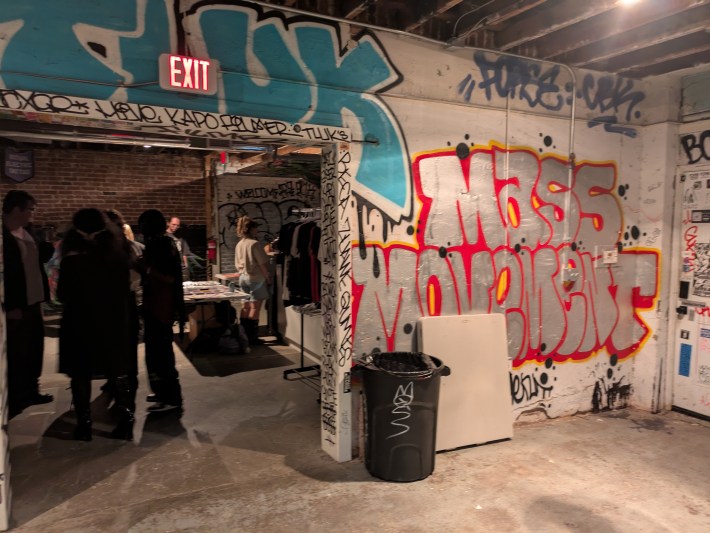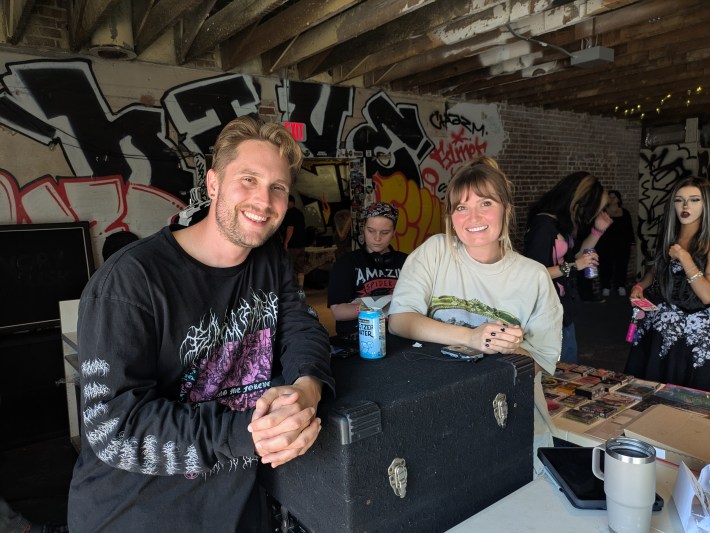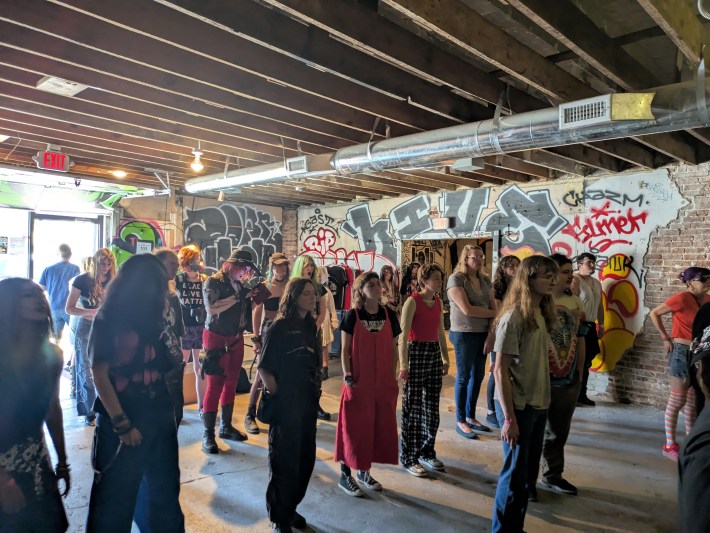Cyberfest
Mass Movement Community Arts
September 6, 2025
“Give yourself time. Ideas'll come. Life'll shake you, roll you, maybe embrace you. The music'll find you.” —Johnny Silverhand (Cyberpunk 2077)
It's late summer, and the dregs of heat hold on as fall moseys in. On a particularly sunny Saturday last weekend, I joined a lineup of local and touring musicians headed for Cyberfest, an exploration of rarely heard sound put together by known Tulsa fringe music advocates Cult Love and Mass Movement Community Arts. Cars with bumper stickers like “I HONK FOR NOISE” lined the street as I walked up. As the doors opened around 3 p.m., an anxious early crowd filtered in, full of familiar faces, including Strangers in Mirrors, Zac from Anthroproach, and Tahlia, the former bassist for Estrvs, who ran up to me to deliver a GODOT-branded BIC lighter featuring the image of my favorite Japanese robot musician Hatsune Miku—which felt topical. With my new Miku lighter and my waterproof notepad (you never know), I was ready to see what Cyberfest was all about.



photos by Henry Roanhorse Gray
It would be easy to miss Mass Movement. Driving along a side road of I-244, just past the gray bridge and the spasms of graffiti that dot endlessly over it, I’d perceived the eyes of a coffee entrepreneur, a la The Great Gatsby’s Dr. T.J. Eckleburg, telling me to “Drink Different.” Not far past that Topeca Roastery billboard is a small building, its windows covered in low-resolution photos of upcoming concerts, band applications, and offers to use the building as a practice space. The spirit of the Do-It-Yourself culture and attitude is strong here—the official Mass Movement logo is a spray tag to the left of the door.


photos by Henry Roanhorse Gray
Inside are the bare necessities of a venue, and I mean that in the best way possible. It has exactly what it needs, namely an unassuming stage just large enough for a full band, just enough light to give warmth and color, a set of speakers that fill the room perfectly, and a side room for setup and merch. I walked around admiring the graffiti, stickers, exposed brick, and broken concrete. The all-ages venue feels both authentic and safe, with a “NO BOOZE, BOZO” sign displayed outside. Straight edge, man.

Before the music started, I caught up with Cult Love co-founder and co-director Natty Gray Watson, who, alongside Mass Movement and their friend Ge’Rae Davis (who performs under the name Vulgar), put together the music festival. Natty had a beaming smile and sweat on his brow from running around, helping artists move gear, and setting up boxes of merch. Natty gave Ge’Rae props for coming up with the idea of a festival that would celebrate the various genres and artists under the cyber music umbrella.
“You know, [cyber music’s] communities mostly exist online,” Natty continued. “So the goal with this festival is to kind of facilitate something [where] that fringe, outside of digital [space], could exist in real life, performance-wise and community-wise.” Cult Love—a non-profit dedicated to the preservation, platforming, and proliferation of underground cultures and communities—seemed the perfect partner for this gig, and Mass Movement the perfect location.

So what is cyber music? As is often the case for music genres, definitions are vague and online arguments about them are hot, but Natty put it well in terms of this festival’s scope: "[Cyber music] can span, like, hyper pop and cybergrind and digital hardcore, to kind of weird, outsider experimental music.” Some common traits are heavy use of synthetic sounds and textures, extreme and harsh vocals, playful beats mixed with strong political messages, and a mix of live instrumentation and pre-recorded samples. Smartphones and laptops were a common sight in nearly every gear load-out, and even one Nintendo Switch Lite, speaking to the digital nature of both the composition and the performance of the genre.
The local cyber music community turned out to hear five local acts and four touring groups at this IRL gathering, which could have been a fashion show as well as a music show. Every variation of punk through the ages was on display in the crowd, from more traditional goth and rave styles to more contemporary alt-punk/alt-goth microtrends. I overheard one person talking about their handmade distressed shirt, and another about their perfume they purchased off the TikTok shop.

Rat Circuit (Tulsa) started the night off strong with the best performance I’ve seen them give. With an iPad-based synth and live drums, the young Tulsa duo launched into a massive wall of noise that deconstructed into some surprisingly danceable songs with intense, emotional lyrics. Staccato vocals and big splashy drums pounded as they played a fast-paced set of several sonically diverse songs for a crowd of about 30 that would grow and change throughout the night.
Solo act Vonq (Tulsa) was next, sporting black war paint and a white and black outfit that seemed more uniform than a stage costume. Vonq’s audio and visual set was designed to grab and hold your attention, with dark synth tones, rough ‘80s digital drums, and intense lyrics on anti-imperialism. Visuals of everything from newsreel footage of Nazi parades and vintage advertisements to scenes of police violence and clips from Tetsuo the Iron Man and Starship Troopers made for a political message that had the power and effectiveness of a policeman’s billy club. Mixed with these visuals, Vonq’s use of vintage synth sounds mixed with punk vocals gave a fantastic 1980s Cold War bleakness to their set.
The next solo act, FEL1Z (Tulsa), came to the stage with the most pared-down set in terms of equipment, armed only with an iPhone and a microphone. Their sound represented the more Midwest emo element of cyber music, mixing growling bass lines with screeching emotional lyrics. FEL1Z bent and contorted as they searched for every ounce of energy they had to deliver each line, while fun, crunchy samples and high-tempo drums kept the crowd hyped.



photos by Henry Roanhorse Gray
Unicorn Hunted (Tulsa), also a local solo project, brought something softer, or so I thought at first. Draped in billowy fabrics and cute accessories, Unicorn Hunted began the set with a beautiful, tense, ethereal intro of sweeping vocal wilting. After a beat of silence, atmospheric break beats began, but the airy vocals continued to meander throughout the tracks. They slow-danced to the songs with a dagger in hand, with equally sharp moments of acid base lines peeking through the otherwise gentle music.
Forevermore (Texas) continued the low-tempo energy with a set invoking the reverb-y and slow beats of 2010s cloudrap and mixing them with crunchy, brain-scratching textures and samples. The crowd swayed along with Forevermore as massive 808 bass kicks shook the entire building. The music was the perfect vibe to play out the end of a hot summer.
Reversal Cell (Tulsa) came in white-hot with a mix of metal drums and riffs, industrial noise, and darkwave synth electronic influences. The duo created a massive sound, with high-flying technical guitar bits and aggressive artificial sounds that made me feel like I was in a mix of Space Invader, DOOM, and a John Wick fight scene. I heard from one attendee who went outside after the set to catch her breath and to give her ears a breather: “Fuck! Well, that's an instant favorite.”
Up next was Safe Word (Texas), who plugged in their teal Nintendo Switch and a microphone and launched into a cacophony of harsh noise and intense beats. Safe Word’s brand of cybergrind harsh noise pushed the small gaming console and the crowd to their limits. Using the music software of an app made by Korg just for the Switch, Safe Word introduced tinges of 8-bit goodness that leaked into otherwise hostile and brutal drum programs, controlling the music with the knobs and buttons of the handheld device.
Ultra (Arkansas), a vocalist backed by live drums, delivered one of my personal favorite sets of the night. Sinister synths, whispering samples, echoey and high energy vocals, and mix of live and programmed drumming all created this fantastic and feral atmosphere that moved even the shyest wallflower to the front. The vocalist got right into the mix of the crowd, walking back and forth while delivering a dizzying performance, pink hair flashing in the lights. The drummer had excellent stage presence as well, often playing with the crowd for laughs between songs.




photos by Henry Roanhorse Gray
After a quick show-saving equipment run by Natty, headliner Strawberry Hospital (Texas) was ready to close out the festival. The two young musicians—with hair in their faces, skinny jeans, and equipment covered in stickers—got on stage and woke up the crowd with some of the most genre-complex music of the night. Screamo, metal, cybergrind, jungle, pop punk, post hardcore, and EDM blurred together seamlessly. The high-pitched and digitally altered vocals flying over fast-paced, chirpy synthetic backgrounds felt like a little heartbroken robot was singing its guts out. After the show, the vocalist showed me all the fun equipment and techniques they use to get the vocals to sound robotic yet organic, to mimic a vocaloid (a fully synthetic vocal software popular in Japan and underground music scenes). I think they nailed it; Hatsune Miku would have been proud.
I left exhausted and sweaty, having danced and grooved in between writing my notes, still jamming in my head. It was a six-hour genre blender that showcased talent both here in Tulsa and elsewhere that otherwise rarely gets a proper stage. Excellent mixing throughout the show, done by Mass Movement, let the artists focus on performing, with each act coming through the speakers perfectly. Natty, Ge’Rae, and the Cult Love team did an excellent job making sure artists had what they needed and felt supported. I do feel like there is more to explore in the underground cyber realms of rap, and I hope to see more of it should Cyberfest return next year.
Overall, to put it in the slang of the cyber streets: The gig was preem, well worth the eddies, and I was sad to delta out of there. Keep rockin’, chooms.






